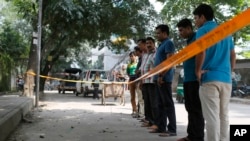Bangladesh has arrested four suspects in connection with the killing of an Italian aid worker who was shot in the South Asian nation's capital in September.
Officials say the suspects have confessed to killing Cesare Tavella, the local project manager of a Netherlands-based global development agency, in Dhaka's diplomatic zone.
Tavella was gunned down by motorcycle-riding assailants, in an attack that was similar to the shooting death days later of a Japanese national in Rangpu, 330 kilometers from Dhaka.
Five days later, a Japanese citizen was killed in a similar attack in northern Bangladesh.
The killings spooked the country's expatriate community and threatened its fragile economy, which is heavily reliant on foreign aid and a $25 billion garment industry supplying clothing for international brands.
The Islamic State group quickly claimed responsibility for Tavella's death, a claim that Bangladesh officials have always rejected, saying the terrorist organization did not have a foothold in Bangladesh. Instead, Bangladesh blamed domestic Islamist militants and politicians for the aid worker's death. Dhaka also rejected Islamic State claims for killing the Japanese man, and for the bombing of a Shiite procession over the weekend that left a teenage boy dead and more than 100 people injured.
Bangladesh has instead accused domestic Islamist militants along with Islamist political parties - specifically the opposition Bangladesh Nationalist Party and its main ally, Jamaat-e-Islami - of orchestrating the violence to destabilize the already fractious nation.
On Monday, Dhaka Metropolitan Police Commissioner Asaduzzaman Mia said the latest arrests supported that theory.
Police say the men were told to kill the aid worker by a "big brother" who told the suspects to focus on killing a white-skinned foreigner to "create chaos" in the country.
The police did not release information on the identity of the "big brother."
“We have identified that so-called big brother. When we are able to arrest that man, it will be clear who used them,” the police commissioner said.
Mia said Monday Tavella was not the specific target, but became a victim simply because he was white. “Tavella was not their specific target, he just became a victim being a white,” Mia said. “The killers asked whether he had any enmity with that foreigner; he replied, ‘No, you have to kill a white man.”'
The killers also said they'd received half of the payment promised for the attack, according to Mia, who did not specify any figures. “We have interrogated them separately. We need to interrogate them more, with permission from court,” he said.
The arrests are considered a major breakthrough for Bangladesh, which has been struggling to stem a rising tide of violence, including the murders of four atheist bloggers claimed by radical Islamist groups this year.
Prime Minister Sheikh Hasina, a moderate who pledged to stamp out militant radical groups, on Saturday reiterated her stance of “zero tolerance” for terrorists. In recent years, she has overseen the arrest of dozens of suspected militants and the banning of six groups.
Experts say the crackdown has left some of the country's more hard-line Muslims feeling alienated, and has led to a resurgence in activity by Islamic extremist groups. Last week, an email purportedly signed by the banned Ansarullah Bangla Team militant group and sent to Bangladeshi media threatened more attacks on atheist bloggers, as well as on working women and media that criticize “jihad.”
Some material for this report came from AP.





